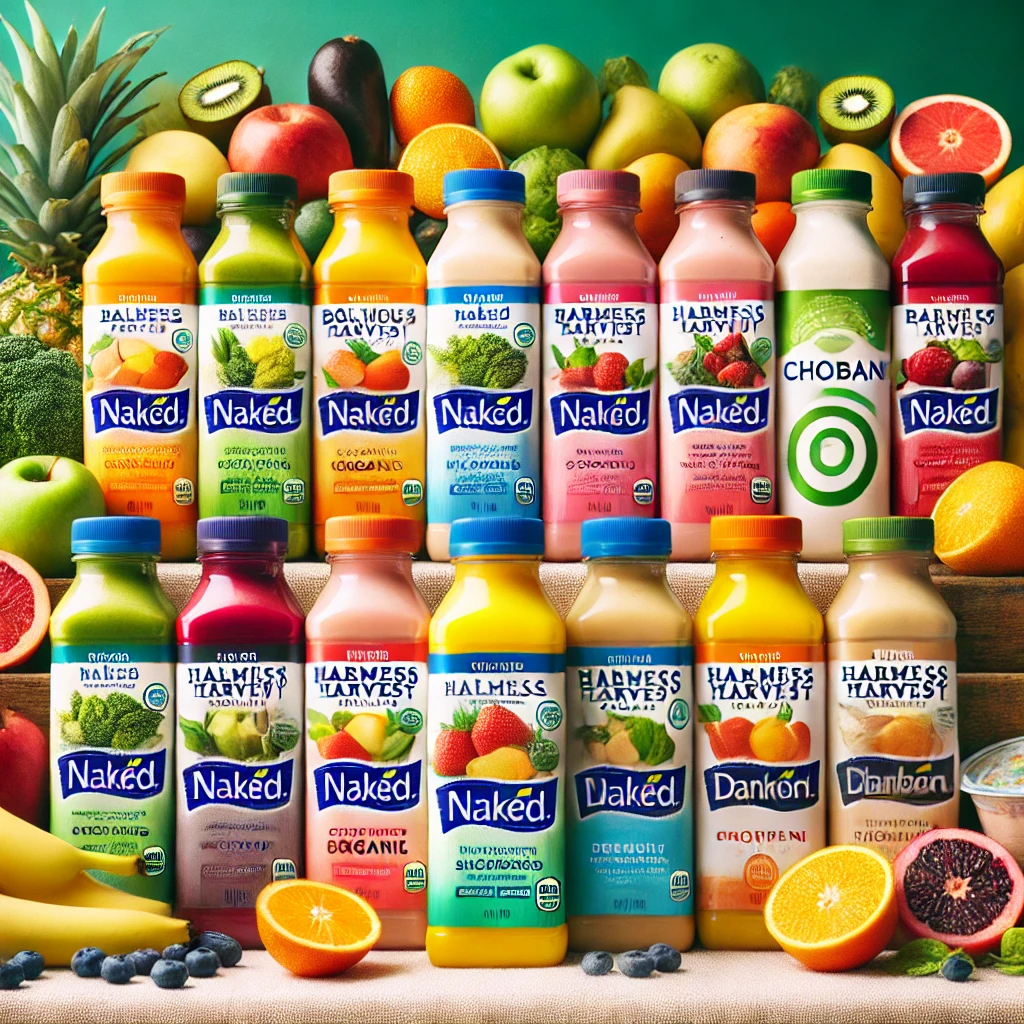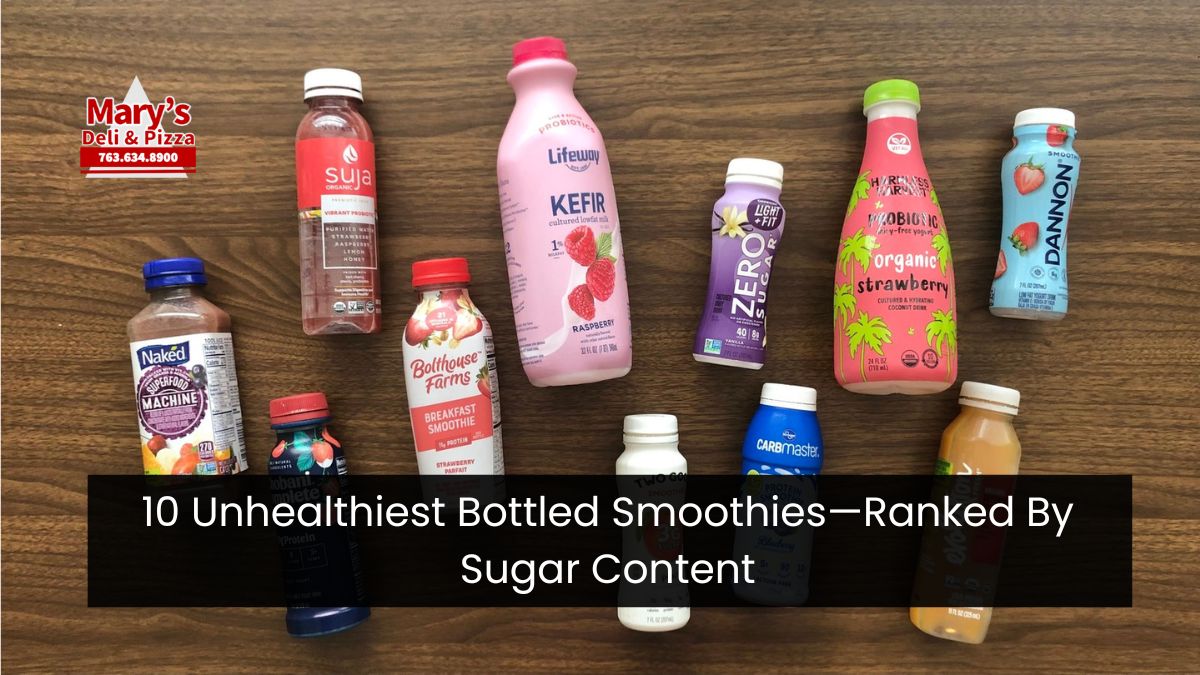Bottled smoothies might seem like a healthy, convenient choice, but a closer look at their ingredients often reveals a startling amount of sugar.
While marketed as nutrient-dense drinks packed with fruits and vegetables, many bottled smoothies are laden with sugar, turning a seemingly healthy option into more of a dessert.
Whether it’s natural sugar from fruit or added sugars during processing, too much sugar can negate the health benefits of these drinks.
This article will break down the 10 unhealthiest bottled smoothies, ranked by their sugar content, to help you make better choices at the store. Let’s dive into what you should watch out for when reaching for a bottled smoothie.
The Hidden Sugar In Bottled Smoothies
Bottled smoothies often contain two types of sugars: natural sugars (from whole fruits or juice concentrates) and added sugars (such as cane sugar, fructose, or brown sugar).
While natural sugars aren’t inherently bad, the problem arises when smoothies use fruit juice concentrates or purees, which remove the fiber found in whole fruits.
Fiber is essential for controlling blood sugar spikes, improving digestion, and promoting satiety, which helps keep you feeling full longer.
Without the fiber, your body processes the sugars in bottled smoothies much like it does with sugary sodas or sweets. This can lead to blood sugar spikes and a subsequent crash, leaving you feeling hungry and fatigued soon after drinking.
Ranking The 10 Unhealthiest Bottled Smoothies By Sugar
Here are the 10 unhealthiest bottled smoothies, ranked by their sugar content, starting with the “least” sugary and ending with the highest sugar-loaded options.

Keep in mind that even those at the bottom of the list are still loaded with more sugar than is typically healthy.
10. Chobani Raspberry Lemonade Greek Yogurt Drink
- Calories: 150
- Sugar: 16g (9g added)
- Fiber: 0g
This Greek yogurt drink may seem like a healthy choice due to its protein content (10g), but it’s packed with 16g of sugar and lacks fiber. With cane sugar as one of the top ingredients and no whole fruit sources, it’s more of a sweet treat than a balanced smoothie.
9. Dannon Strawberry Banana Smoothie
- Calories: 110
- Sugar: 18g (14g added)
- Fiber: 3g
While this smoothie provides a moderate 6g of protein and 3g of fiber, the overwhelming 14g of added sugar overshadows the nutritional benefits. Added fructose and sugar are high on the ingredient list, making this smoothie less healthy than it appears.
8. Harmless Harvest Organic Mango Coconut Smoothie
- Calories: 110
- Sugar: 18g (no added sugar)
- Fiber: 2g
Although this smoothie contains no added sugars, the 18g of natural sugar from mango puree and juice concentrate makes it a high-sugar option with minimal fiber or protein to provide lasting energy.
7. Bolthouse Farms Protein Plus Nut Butter Chocolate
- Calories: 400
- Sugar: 33g (23g added)
- Fiber: 4g
This smoothie packs 30g of protein, which may seem appealing, but the hefty 33g of sugar (with 23g being added sugars) makes it a poor choice for a balanced meal. Despite its high protein, it can cause blood sugar spikes due to its high sugar content.
6. Bolthouse Farms Energy Peach Carrot Mango
- Calories: 190
- Sugar: 40g (no added sugar)
- Fiber: 4g
Despite being marketed as an “Energy” smoothie with caffeine and B vitamins, the 40g of sugar (derived mostly from juice concentrates) and minimal protein (2g) make this smoothie far from nutritious. The sugar comes from highly processed fruit juices that spike blood sugar levels.
5. Bolthouse Farms Strawberry Parfait Smoothie
- Calories: 350
- Sugar: 44g (27g added)
- Fiber: 12g
While this smoothie provides an impressive 12g of fiber, the 27g of added sugar make it less healthy than it seems. The high sugar content nearly cancels out the benefits of the fiber, which is necessary for managing blood sugar.
4. Bolthouse Farms Berry Boost
- Calories: 230
- Sugar: 47g (no added sugar)
- Fiber: 6g
The Berry Boost smoothie is a sugar-laden drink with almost 50g of sugar per bottle, despite its fiber content of 6g. With no protein and sugar mostly from juice concentrates, this drink will spike blood sugar without providing any lasting energy.
3. Bolthouse Farms Strawberry Banana Smoothie
- Calories: 260
- Sugar: 50g (no added sugar)
- Fiber: 5g
Bolthouse Farms’ Strawberry Banana smoothie contains an astounding 50g of sugar, with the bulk coming from fruit purees and concentrates. With only 1g of protein, this smoothie won’t keep you full and is likely to leave you craving more sugar soon after drinking.
2. Naked Boosted Smoothie Superfood Machine
- Calories: 270
- Sugar: 54g (no added sugar)
- Fiber: 2g
This smoothie is loaded with superfoods like spirulina, but it contains a staggering 54g of sugar from fruit juice concentrates, with only 2g of fiber and 4g of protein. Drinking this will lead to a sugar crash without providing long-lasting satiety or nutrition.
1. Naked Boosted Smoothie Blue Machine
- Calories: 320
- Sugar: 55g (no added sugar)
- Fiber: 3g
The worst offender on the list, the Naked Boosted Smoothie Blue Machine, has a shocking 55g of sugar per bottle. With just 2g of protein and 3g of fiber, this smoothie is likely to spike your blood sugar and leave you feeling hungry shortly after consumption.
Why Is Excess Sugar A Problem?
The recommended daily intake of added sugar for women is no more than 25 grams, while for men it’s no more than 36 grams, according to the American Heart Association.
Many of the smoothies listed above exceed these recommendations in just one bottle. Excessive sugar consumption can lead to various health issues, such as:
- Weight gain
- Insulin resistance
- Increased risk of type 2 diabetes
- Heart disease
- Increased risk of certain cancers
Moreover, smoothies that are high in sugar but low in fiber and protein won’t keep you full or provide lasting energy, making you more likely to overeat or reach for more snacks soon after consumption.
Healthier Alternatives
If you still want to enjoy smoothies without the excessive sugar, here are some tips to make healthier choices:
- Make your own smoothies using whole fruits, vegetables, and protein-rich ingredients like Greek yogurt or protein powder. This way, you control the sugar content and can add fiber-rich ingredients like chia seeds, flaxseeds, or oats.
- Look for store-bought smoothies with lower sugar content and higher fiber. Some brands focus on using whole fruit and adding fiber or protein to keep you full.
- Check the ingredient list. Opt for smoothies that list whole fruits or vegetables first, rather than fruit juice concentrates or purees, which strip away the fiber.
Conclusion:
Bottled smoothies may seem like a convenient way to get your daily dose of fruits and vegetables, but many are loaded with sugar and lack the fiber or protein necessary to keep you full and support balanced blood sugar levels.
When choosing a bottled smoothie, be sure to check the label for added sugars and opt for drinks that provide a balance of protein, fiber, and healthy ingredients.
Alternatively, making your own smoothies at home with fresh, whole foods can help you enjoy all the health benefits without the excessive sugar.

